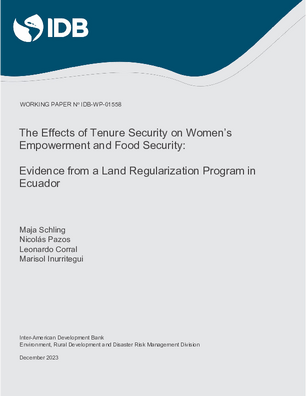The Effects of Tenure Security on Women's Empowerment and Food Security: Evidence From a Land Regularization Program in Ecuador
Date
Dec 2023
This paper evaluates the impact of a rural land administration program in Ecuador on female empowerment and household food security. Using a double robust estimation that combines the difference-in-difference approach with inverse probability weighting, we explore whether receiving a georeferenced cadastral map of ones parcel provides women with increased bargaining power, empowering them to participate more actively in productive and consumption decision-making that leads to improved diversification of the production portfolio and the households food security. Although we find no significant effects on aggregate levels of empowerment, results show that female beneficiaries became more empowered with regards to access to resources, particularly in terms of applying for and receiving credit. Program participation also significantly affected womens time use, as beneficiary women spent more hours working in non-agricultural activities, investing in their own businesses, and generating off-farm wages. Households who received jointly titled cadastral maps also increased their food security and shifted their production portfolios towards crops and livestock products of both higher market and nutritional value. These results suggest that increasing informal tenure security through cadastral mapping may spur female empowerment, which enables women to increase their bargaining power within the household in order to improve their own and the family's overall welfare.




